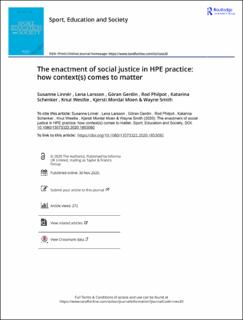The enactment of social justice in HPE practice: How context(s) comes to matter.
Linnér, Susanne; Larsson, Lena; Gerdin, Göran; Philpot, Rod; Schenker, Katarina; Westlie, Knut; Moen, Kjersti Mordal; Smith, Wayne
Peer reviewed, Journal article
Published version
Permanent lenke
https://hdl.handle.net/11250/2732061Utgivelsesdato
2020Metadata
Vis full innførselSamlinger
Originalversjon
10.1080/13573322.2020.1853092Sammendrag
For more than 40 years, health and physical education (HPE) academics in universities and teacher education colleges have drawn attention to issues of social justice specific to the context of PE and advocated for teachers in fields, gymnasiums and other physical activity spaces to do a better job of promoting more equitable outcomes for all students. Building on this advocacy, in the late 1990s, countries such as Sweden, Norway and New Zealand designed HPE curricula that address social justice. However, limited research has focused specifically on the enactment of social justice in HPE practice. Drawing on a larger international project involving Sweden, Norway and New Zealand the aim of this article is therefore to explore the constitution of social justice pedagogies across these three different HPE contexts and more specifically how HPE teaching practice may be understood from regulative, normative and cultural perspectives on social justice. The data reported on in this paper were generated from educational acts, curriculum documents, observations of HPE lessons in each of the three countries and follow-up teacher interviews. In order to analyse the data, we employed Scott’s (2008. Institutions and organizations: Ideas and interests (3rd ed). Sage) institutional theory to further understand and discuss the enactment of social justice across the three different countries in HPE practice. In our representation and analysis of the findings we draw attention to how social justice pedagogies are informed differently by institutionalised governing systems and therefore they may be enacted differently by teachers in different societies. In particular, we highlight the influence of (i) regulative; (ii) normative; (iii) cultural-cognitive elements on practice. We conclude by pointing out the complex interplay between regulative, normative and cultural-cognitive elements that both enable and constrain HPE teachers’ enactments of social justice in HPE practice.

